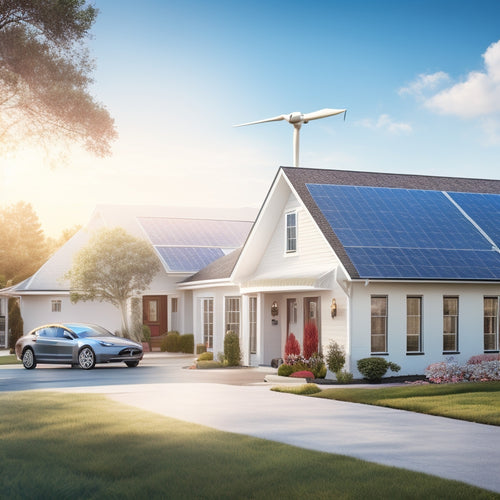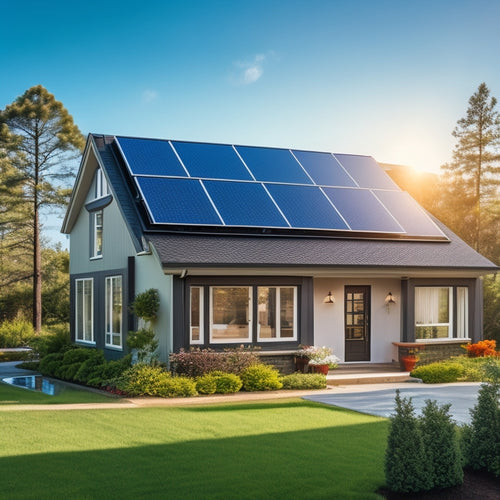
Optimal Solar Panel Cleaning Schedule for Homeowners
Share
You need a tailored cleaning schedule to maximize your home solar panel system's energy output. Regional climate and environmental factors like dust, pollen, and humidity substantially impact performance. For coastal areas, clean every 2-3 months; for urban and desert regions, clean every 1-2 months. During spring and summer, prioritize cleaning to guarantee maximum energy production. Identify high-risk debris areas like edges, corners, and roof valleys, and clean them regularly. By following these guidelines, you'll be well on your way to optimizing your system's performance. Now, explore further to refine your cleaning schedule and confirm your system operates at its best.
Key Takeaways
• Determine cleaning frequency based on regional climate, with coastal, urban, and desert regions requiring more frequent cleaning.
• Clean solar panels during spring and summer to maximize energy production and address increased debris accumulation.
• Incorporate preventive habits into maintenance routines to identify and address potential issues before they impact efficiency.
• Prioritize cleaning high-risk areas, including edges, corners, and areas surrounding mounting hardware, to ensure optimal energy output.
• Consider outsourcing cleaning tasks to professional services to ensure peak system performance without maintenance hassles.
Understanding Solar Panel Efficiency
As you assess the performance of your solar panel system, understanding solar panel efficiency is essential to maximizing energy production.
You want to make certain your system is generating the most energy possible, and that starts with understanding how efficient your panels are.
Solar panel efficiency refers to the percentage of sunlight that's converted into electrical energy.
A higher efficiency rating means more energy output from the same amount of sunlight.
When evaluating your solar panel system, consider the panel durability and its impact on energy output.
A well-maintained system with durable panels can maintain its efficiency over time, while a system with degraded panels will see a decrease in energy production.
Factors like temperature, shading, and soiling can all impact efficiency, making it vital to monitor and address these variables.
By understanding solar panel efficiency, you can identify areas for improvement and optimize your system for maximum energy production.
Determining Cleaning Frequency Needs
You need to develop a cleaning schedule tailored to your solar panel system's unique needs, taking into account factors like climate, pollution, and panel angle to facilitate maximum energy production.
Considering these factors will help you determine the optimal cleaning frequency for your system.
Environmental factors such as dust, pollen, and humidity can significantly impact your solar panel's performance.
Regional variations in climate can also play a significant role in determining cleaning frequency.
Coastal regions: Saltwater and humidity can accelerate corrosion and dirt buildup, requiring more frequent cleaning.
Urban areas: Higher pollution levels can lead to more frequent cleaning needs.
Desert regions: Dust and sandstorms may necessitate more frequent cleaning to maintain optimal energy output.
Seasonal Cleaning Schedule Breakdown
As you develop a seasonal cleaning schedule, you'll need to adjust your strategy to accommodate the changing seasons.
During the spring and summer months, you'll want to prioritize cleaning to guarantee maximum energy production.
Spring and Summer Months
During the spring and summer months, your solar panels require more frequent cleaning to maintain maximum energy output, as debris and dirt accumulate rapidly due to increased precipitation and foliage growth.
As you enjoy the blooming flowers and plan your sunny vacations, remember that your solar panels need extra attention during this time.
Key considerations for efficient cleaning during the spring and summer months include:
Increased debris accumulation: With more trees and plants in bloom, leaves, and flower petals can fall onto your solar panels, reducing their efficiency.
Higher humidity and precipitation: Spring and summer showers can leave dirt and grime on your solar panels, further reducing their energy output.
Peak sun hours: With longer days and more direct sunlight, your solar panels are working at their maximum capacity, making it essential to confirm they're clean and free of debris to maximize energy production and achieve ideal performance during this period.
Year-Round Maintenance Tips
Throughout the year, a well-planned cleaning schedule helps maintain your solar panels' peak performance, guaranteeing maximum energy output and minimizing revenue losses.
By incorporating preventive habits into your maintenance routine, you'll be able to identify and address potential issues before they affect your energy production.
Conducting regular energy audits will help you identify areas for improvement and enhance your solar panel system's performance.
This includes monitoring your energy output, inspecting your panels for debris and damage, and performing routine cleaning and maintenance tasks.
To guarantee your solar panels operate at their best, develop a year-round maintenance schedule that includes:
-
Regular inspections to identify and address potential issues
-
Scheduled cleanings to maintain peak energy output
-
Performance monitoring to identify areas for improvement
- Energy audits to refine your system's performance
Identifying High-Risk Debris Areas
When inspecting your solar panel array, you'll want to focus on areas prone to debris accumulation, such as the edges of panels, corners, and areas surrounding mounting hardware. These areas tend to collect dirt, dust, and other obstructions that can hinder your solar panels' performance.
To ensure optimal energy production, it's crucial to identify and prioritize high-risk debris areas.
Tree branches: Overhanging branches can drop leaves, twigs, and other debris onto your solar panels, compromising their efficiency. Trim nearby trees to maintain a safe distance from your solar array.
Roof valleys: Debris tends to accumulate in roof valleys, where water flows and carries dirt and debris towards your solar panels. Regularly cleaning these areas will help prevent debris buildup.
Gutters and downspouts: Clogged gutters and downspouts can cause water to overflow, carrying debris onto your solar panels. Clean your gutters regularly to prevent this issue.
DIY Cleaning Methods and Tools
As you prepare to clean your solar panels, you'll need the right tools and techniques to get the job done safely and effectively.
You'll want to gather essential cleaning supplies like soft-bristled brushes, distilled water, and a microfiber cloth to avoid scratching the panels.
Essential Cleaning Supplies
You'll need a few essential cleaning supplies to effectively remove dirt and debris from your solar panels, starting with a soft-bristled brush or a scrubber specifically designed for solar panels. This will help loosen and remove stubborn dirt without scratching the panels.
A microfiber cloth is another essential supply. Look for high-quality microfiber cloths that are gentle on your solar panels and effective at absorbing water. This will help minimize water usage, promoting water conservation.
Deionized water is also necessary. Using deionized water will prevent mineral buildup on your solar panels, ensuring maximum energy production.
A mild soap or cleaning solution specifically designed for solar panels is also required. This will help remove dirt and grime without damaging the panels.
Safe Cleaning Techniques
Using the right techniques and tools is essential to safely clean your solar panels and maintain their peak energy output.
You'll want to avoid using harsh chemicals, abrasive materials, or high-pressure washes that can damage the panels or their frames.
Instead, opt for gentle agitation methods that won't scratch or compromise the panel's surface.
For DIY cleaning, you'll need a few simple tools.
Start with a soft-bristled brush or a microfiber cloth to remove loose debris.
Then, mix a mild soap solution with distilled water in a spray bottle.
Spray the solution onto the panels, and use your microfiber cloth to wipe them clean.
Be gentle, as you'd when cleaning a delicate surface.
Avoid using tap water, which can leave mineral deposits that reduce energy output.
Distilled water is the way to go.
For more stubborn dirt or grime, you can use a soft-bristled brush to gently scrub the area.
Rinse the panels thoroughly with distilled water to remove any soap residue.
Professional Cleaning Service Options
Hiring a professional solar panel cleaning service can be a cost-effective solution for maintaining maximum energy output, especially for large-scale installations or those in high-debris environments. This option is particularly beneficial if you have a large number of panels or limited time for maintenance.
By outsourcing the cleaning task, you can guarantee your system operates at peak performance without the hassle of doing it yourself.
When selecting a professional cleaning service, consider the following key factors:
Insurance coverage: Verify the service provider has adequate insurance coverage to protect you and their workers in case of accidents.
Contracts negotiation: Clearly outline the scope of work, frequency of cleaning, and payment terms to avoid misunderstandings.
Certifications and experience: Verify the service provider's certifications, experience, and reputation to guarantee a high-quality cleaning job.
Frequently Asked Questions
Can I Use a Pressure Washer to Clean My Solar Panels?
When cleaning your solar panels, avoid using a pressure washer, as it can cause water damage; instead, opt for a wide-angle spray nozzle with a low-pressure setting to guarantee a safe and effective cleaning process.
How Often Should I Clean My Solar Panels During a Drought?
During a drought, you'll want to clean your solar panels every 2-3 weeks, as dust accumulation accelerates in water-scarce environments, reducing panel efficiency by up to 25%!
Are There Any Local Regulations for Cleaning Solar Panels?
You should check with your local government to see if there are any permit requirements or municipal codes governing solar panel cleaning in your area, as regulations can vary substantially from one region to another.
Can I Clean My Solar Panels at Night or in the Shade?
You can clean your solar panels at dusk or in partial shade, but be aware that dusk cleaning may not be effective due to dew or moisture, and shadow impact can reduce cleaning efficiency by up to 20%.
Will Cleaning My Solar Panels Void My Warranty?
When you clean your solar panels, you won't automatically void your warranty, but you must follow the manufacturer's requirements and warranty terms to avoid any potential issues or disputes.
Related Posts
-

Why Homeowners Are Embracing DIY Energy Independence
By taking control of your energy needs, you're breaking free from the uncertainty of utility bills and embracing a se...
-

What Role Do Unicycles Play in Urban Transport?
As you navigate through congested city streets, unicycles emerge as a viable solution, slashing carbon emissions by u...
-

Solar Power Units Perfect for Homes
You're considering installing a solar power unit in your home, a decision that can notably reduce your reliance on tr...


